- Home
- T.A. Barron
The Ancient One Page 2
The Ancient One Read online
Page 2
She tugged on the brown envelope. “It’s mine,” she said.
The boot did not budge. For a moment, nothing seemed to move but the grin, which widened slightly.
“Mine,” repeated Kate, tugging unsuccessfully. “The envelope’s mine.”
The man, whose brown eyes watched the girl at his feet with amusement, spoke gruffly. “What envelope?”
Kate furrowed her brow. “This one, here. You’re standing on it.”
“I don’t see any envelope,” he answered. He turned toward an older boy standing nearby, as burly as himself but not as tall. “Sly, do you see any envelope?”
“No,” the older boy answered, himself grinning. “All I see is my brother Billy, and some girl who likes to crawl around in mud puddles.”
At that moment, the red-haired boy, his yellow slicker splattered with mud, moved to Billy’s side. “Well,” he said, eyeing Kate hatefully. “I brought you the envelope.”
“Yeah,” answered Sly, stepping closer to them. “But you brought her too.”
“I couldn’t help it,” protested the red-haired boy, bending his lean frame to retrieve the brown envelope. Billy lifted his boot just enough to let him slide it out. “She chased me here from the post office.”
The big logger gave him a teasing shove on the shoulder. “That’s a new experience for you, getting chased by a girl.” He winked at Sly. “He’s so excited, he’s still puffing like a bay steer.”
Even in the rain, the boy’s blush was clearly visible. “Look,” he said, waving the envelope. “You asked me to get it, and I did. It wasn’t so easy, either.”
“You’re a thief,” declared Kate.
Billy’s grin disappeared as he concentrated his gaze on her. “Go home now and there won’t be any trouble.”
Kate pushed herself to her feet. Her heart pounded, but she made herself look the broad-shouldered man directly in the eye. “That’s not your envelope. It’s not. It’s addressed to my Aunt Melanie.”
“Aunt Melanie?” asked Billy, his eyebrows lifting. “So you’re related to the old schoolteacher?”
“Yes. And that envelope belongs to her.”
Billy scowled at the red-haired boy. “You really botched this one, Jody.” He stepped toward Kate, so that his ample chest almost touched her chin. “You’ve got five seconds to disappear, kid. Are you gonna go all by yourself, or do I have to chase you from here to hell’s half acre?”
Before Kate could reply, a heavily laden logging truck rumbled down the street. The noise drowned out the voices from Cary’s Tavern as it splashed past. Just as Billy, Sly, and Jody turned toward the sound, Kate lunged at the brown envelope, tearing it from Jody’s hand. She darted behind the logging truck and ran as fast as she could down an alley behind the tavern.
Leaping over a broken crate, Kate could hear the slapping sound of heavy boots behind her. She grasped the brown envelope as tightly as she could, determined not to lose it again. Not even when she stole home plate in the league softball tournament in May had she run so fast. Yet the heavy boots drew closer by the second, smacking against the mud.
She didn’t dare turn around. All her energy was focused on one thing and one thing only: running. For her life. Now she could hear someone’s breathing drawing nearer. Seeing a corner just ahead, she didn’t slow down even to make the turn.
As she rounded the corner, her foot suddenly slid out from under her. She lost her balance, flipping onto her back in a spray of brown water. Lifting her head, she saw Billy, followed by his brother and the red-haired boy, bearing down on her. Billy’s eyes glared angrily as he ran right at her, barreling ahead like a fully loaded logging truck.
Kate rolled to her hands and knees in the deep puddle, still clutching the envelope. She wanted to scream, but her throat released no sound. Water dripped down her back and across her abdomen. She stiffened, preparing to be caught.
Then, unaccountably, Billy and the others ran straight past her, as if she weren’t even there. The heavy boots slapped into the puddle, only inches from her submerged fingers, splashing muddy water in her eyes.
As she wiped her face with the inner collar of her jacket, she slowly lifted herself to her feet, panting heavily. Her pursuers turned a corner onto the next street, their pounding boots punctuating the steady sound of the rain. How? she asked in disbelief. How did they miss me?
At that instant, she heard a rustling sound behind her. Out from the shadows of the windowless building on the corner stepped a diminutive figure, whose curly white hair was visible at the edges of a tightly drawn hood. Holding in one hand a slender walking stick, the figure regarded her intently.
“Aunt Melanie,” cried Kate, stumbling toward her. “Did you see that? They—they were chasing me. But when—when I fell, they—”
“Easy, dear, easy,” said the woman in a soothing voice.
“Ran right on like—like they didn’t, didn’t even see me,” panted Kate. “I don’t get it. They were chasing me, I know it.”
Aunt Melanie merely nodded, her dark eyes glinting. She tapped her walking stick sharply against the side of her boot, as if trying to knock some mud off it.
Kate started to speak again, when her attention was caught by the walking stick. For a brief instant, the yellow eyes of the carved owl’s head on the handle seemed to glow strangely. Then, swiftly, the brightness faded.
Puzzled, Kate looked over her shoulder to see the sun trying to make a late-afternoon appearance through the slackening rain. Of course, she realized. It’s just catching the sunlight. She turned again to the stick, now looking like an ordinary piece of wood, its color and grain dulled by wetness. The owl’s head handle had no more life than the handle of an old umbrella.
She shook her head and focused once more on Aunt Melanie. “How could they have missed me?”
Blowing a drop of water from the tip of her nose, the woman examined Kate thoughtfully. Her white curls, studded with raindrops, framed her face like a fluffy cloud. “Heaven only knows. I daresay they were going awfully fast. Why were they chasing you?”
Proudly, Kate raised the brown envelope. Mud streaked its crumpled surface, obscuring the address label. But Aunt Melanie recognized it immediately, and her eyes opened wide.
“Good grief. You mean they tried to steal my mail?”
Kate nodded. “Came pretty close, too.”
Aunt Melanie took the brown envelope and stuffed it into the pocket of her blue rain jacket. “Never thought they’d stoop to such a thing, or I wouldn’t have sent you. Something told me I shouldn’t have let you go by yourself. I’m glad the phone call finally came, so I could come after you.” She pursed her lips. “This whole town is coming apart at the seams.”
“What do you mean by that?”
“Oh, nothing, nothing. You’re all right, though?”
Refusing to let her change the subject, Kate asked, “Aren’t you going to see what’s in it? Must be pretty important.”
“It can wait till I get home.” With a tilt of her head, Aunt Melanie beckoned Kate to follow and started walking down the deserted street. “Let’s get moving before they decide to come back this way. Billy’s got a nasty temper.”
Kate frowned, reluctantly giving up for the moment. She trotted to her great-aunt’s side, musing, “Sure would be nice if we could make ourselves invisible any time we wanted.”
Aunt Melanie made no response. She merely hesitated slightly in her step, as if she had caught her foot on something, then resumed her normal pace. The walking stick continued to poke its way rhythmically through mud puddle after mud puddle.
2
fennel seeds and
scottish roots
THEY turned down a side street, soon leaving behind the last moss-covered buildings of Blade. As they passed a junkyard piled high with used tires and rusting auto parts, the rain ceased, at least temporarily. Kate threw back her hood, unsnapped her jacket. The thought of her pursuers began to fade, like water evaporating in the sun’s ra
ys.
Before long they reached the bridge across Jones River, so murky from erosion that it supported no more than a few struggling fish. Kate leaned over the railing to watch the dark water flowing under the bridge. Someone had tied an old tire to a worn length of rope and dangled it from the branch of a sturdy cedar across the bank, making a simple swing.
Instinctively, she stooped to pick up a small rock, hefted it for a moment in her right hand, then hurled it at the tire. The rock whooshed straight through the hole in the middle, striking the trunk of the cedar with a smack.
“Not bad,” said Aunt Melanie, laughing. “I can see why you’re so good at baseball.”
“Softball,” corrected Kate. “Someday I’ll have to teach you how to throw. Who knows? You might end up a better shortstop than me.”
“Don’t count on it. Remember what happened when you tried to explain baseball cards to me?”
Kate shook her head. “I couldn’t even get into hall-of-famers and batting averages. I spent the whole time convincing you that a baseball club and a baseball bat are two different things.”
The elder woman grinned at the younger. “Consider that an accomplishment, dear.”
They continued walking, soon reaching a lane lined with Norway spruce, whose upturned boughs never failed to make Kate wonder whether they had happy, uplifted spirits. Of course, trees didn’t really have individual personalities, but it was fun to imagine such things nonetheless.
Not far up the road she spied a rusted green mailbox with hand-painted black letters reading Melanie Prancer. Parked next to the mailbox, leaning precariously in a deep rut, was an equally rusted red Jeep. Trusty, Aunt Melanie called it. A soggy daisy hung twisted around the top of the antenna.
Kate leaped across the permanent puddle beneath the mailbox and stood facing the cottage. It was a cramped, box-shaped structure, thought to be the first house built in the settlement of Blade almost a hundred years ago. The old squared-off logs, hewn with a broad ax so that diagonal chop marks were still visible, were warped to the point where the chinking in some places was as wide as the logs themselves. Permanently musty, the house felt cold in the summer and still colder in the winter. Aunt Melanie’s heating system consisted of a large fireplace, a small electric space heater (reserved for overnight guests), and a huge cedar chest filled with bulky sweaters of all colors, styles, and patterns.
Tiny though the cottage was, it was roomy enough for Aunt Melanie. As long as she had space for a few garden tools, her favorite Native American artifacts, and a jar or two of peppermint candies, she could practically live inside the trunk of a tree. At times she even reminded Kate of some spritely gnome, standing amidst the sword ferns and flowering rhododendrons that surrounded the little house, smelling like spice tea and wet moss, scratching the top of her white head with a look of both wonder and mischief. Also like a gnome, she had the annoying habit of appearing and disappearing suddenly, usually when Kate least expected it.
Rain started falling again, and Kate pulled up her hood. At that moment, two mud-splattered ducks waddled onto the driveway, side by side, quacking noisily. Like a pair of old men trading boastful tales, they jabbered constantly, oblivious to anyone else. She recognized them as Chuck and Chuckles, the ducks Aunt Melanie had adopted, or more accurately, who had adopted Aunt Melanie, last spring. They waddled over to the puddle by the mailbox and began to glide around, quacking continually.
From the moment Aunt Melanie had invited her to spend the first week of summer vacation with her here at the cottage, Kate had known that this visit would be different from the others. Not just because her parents would be on the ship and unreachable the whole time. Though she would not allow herself to say so out loud, she hoped in her heart that being here would help her get over Grandfather’s death.
I still miss him, she told herself, brushing away from her nostrils the river of drizzle that started at the crook in her hood and ran all the way down the bridge of her nose. She remembered Grandfather saying once that the creation of the universe wasn’t just a onetime event, that it was going on all the time, right now even—that the briefest afternoon shower helped continue the process. Given that, she thought wryly, this rain-soaked land must be the most creative place on earth. Grandfather hated foul weather. It depressed him. Made him, as he said, think like a duck instead of a man. He never could understand why his younger sister had chosen to teach school in rural Oregon, where any creatures who lacked webbed feet were at a big disadvantage.
Visiting Aunt Melanie was more than an escape, though it was a relief for Kate not to look out her window every day and see the garden where she and Grandfather had so often picnicked, where not even the relentlessly playful golden retriever Cumberland felt like playing anymore. More important was the simple fact of Aunt Melanie’s quiet company. No words needed. Whether they were baking bread together, or husking corn before supper, or walking in the woods, Kate felt accepted with all her flaws, in a way that could heal even the deepest wounds.
She watched as her great-aunt mounted the cottage’s stone step and fiddled with her keys. She seemed very small, even delicate, the sort of person one could easily pass on the street without noticing. It was Aunt Melanie’s eyes that were impossible to forget: dark, almost black, resonant as ebony, with a few flecks of hazel green around the edges of the pupils. Eyes like hers seemed to reveal Native American, rather than Scottish, ancestry. Her high cheekbones and wide face also contributed to the impression. Only yesterday, Kate had found an old photograph of her as a youngster (with jet black hair instead of the current creamy white) playing with Grandfather on the Isle of Skye, and it was impossible to tell they were related to each other.
As Kate herself ascended the step, she paused to read the crudely carved wooden plaque leaning against the porch railing:
There is a pleasure in the pathless woods,
There is a rapture on the lonely shore,
There is society, where none intrudes,
By the deep sea, and music in its roar:
I love not man the less, but Nature more.
She recalled that Lord Byron’s words had once hung on the front door, but the plaque was torn off and broken by some rowdy high school students last year. Aunt Melanie had put the pieces back together, with some help from a carpenter friend, but had not gotten around to hanging it again.
A few moments later, having deposited her foul weather gear in the mud room and her wet sneakers by the hearth, Kate was cuddled beneath a soft blue-gray quilt in front of the fireplace. She knew her damp jeans would dry quickly. Aunt Melanie rested beneath her own quilt, a green and lavender check, in the rocking chair opposite, sipping spice tea.
Pulling her quilt higher so that it wrapped around the back of her neck, Kate blew across the rim of her stoneware mug and took a swallow. “We had this kind this morning. What’s in it? Tastes so different from other teas. Sweeter somehow.”
“Crushed fennel seeds,” came the reply. “Good thing you like it, since it’s the only kind I have right now. It’s good for afternoon chills.” The white-haired woman paused reflectively. “And other things too.”
Kate blew again, sipped again. “Like what?”
Aunt Melanie grinned imperceptibly. “Like making youngsters ask lots of questions.”
Crinkling her nose, Kate protested, “Come on, tell me.”
“Well, if you really want to know…” she began, before her voice trailed off. She loosened her quilt and slid forward in her chair. Casting her eyes around the room in mock suspicion, she whispered, “Drinking fennel seeds can make you invisible.”
Kate giggled, dribbling some tea down her chin. “So that’s why Billy missed me?”
Aunt Melanie savored the question, then replied, “Yes, but it only works on people as big as tugboats.”
They both burst out laughing. Aunt Melanie shook so hard that some of her tea sloshed onto her quilt. “Of course,” she added, “the bigger they are the more fennel seeds it takes.�
�� She dabbed at the spilled tea with a tattered kerchief from her pocket.
“I thought maybe those neon green shoelaces you gave me scared them off,” teased Kate.
“Really, now,” answered Aunt Melanie, pretending to be insulted. “Those laces have nothing to do with neon. They’re bright, that’s all. Like new green leaves on the first day of spring.”
“More like the sign in front of Cary’s Tavern, if you ask me.”
Aunt Melanie shook her head. “No taste in your generation, none at all.” She winked at Kate. “Of course, there was no taste in my generation either. We’re the ones who invented supermarkets and eight-lane highways.” Then all at once, her mirth evaporated. “All the same,” she muttered, “it’s hard to believe they’d try something like that.”
Kate studied her closely. Her thickly woven Cowichan sweater, milky white and decorated with rows of tiny black eagles with wings spread wide, bunched up against her chin so that she looked almost like an owl peering out from a small snowdrift. From each of her ears dangled a string of silvery shells that clinked together gently whenever she turned her head.
No other person in Kate’s experience was quite like Aunt Melanie, certainly no other schoolteacher. She could be playful as a kitten or solemn as a tree stump. Something about her just didn’t seem to belong here in the middle of rural Oregon. Yet that wasn’t it, exactly. Aunt Melanie didn’t seem so much out of place as she seemed, inexplicably, out of time. There was something mysteriously ageless about her, both younger and older than her years, almost as if she belonged in some other century.
Kate especially enjoyed the times when Aunt Melanie—usually crunching on a peppermint—shared some of her knowledge of Native American lore. She knew as much as anyone alive about the Halamis, a people who vanished so long ago from this area that their lives were almost completely veiled in mystery. Sometimes Kate would return to the cottage to find a Native American friend sitting by the fire with Aunt Melanie, trading speculations about why the Halamis disappeared so suddenly, almost without a trace. And Aunt Melanie’s library on Halami life and culture was so good that professors, researchers, and archaeologists from all over the region often stopped by just to borrow a book or check a reference.

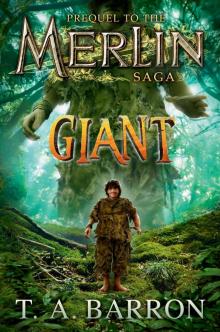 Giant
Giant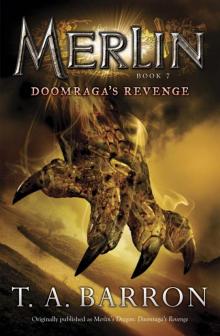 Doomraga's Revenge
Doomraga's Revenge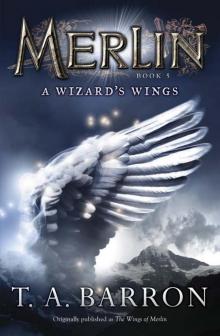 A Wizard's Wings
A Wizard's Wings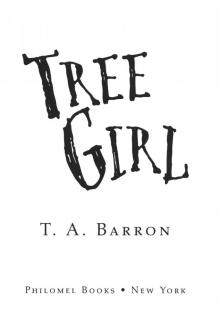 Tree Girl
Tree Girl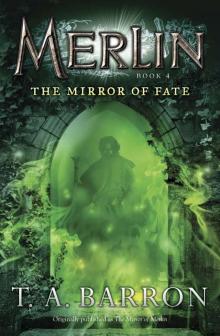 The Mirror of Fate
The Mirror of Fate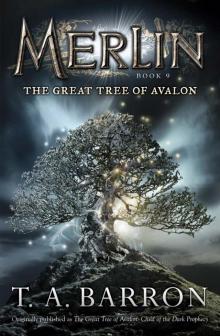 The Great Tree of Avalon
The Great Tree of Avalon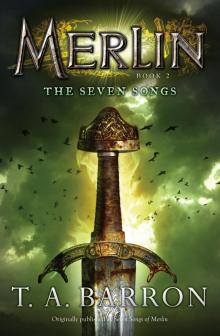 The Seven Songs
The Seven Songs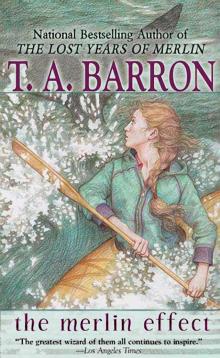 The Merlin Effect
The Merlin Effect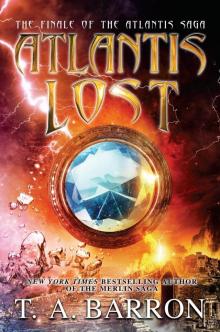 Atlantis Lost
Atlantis Lost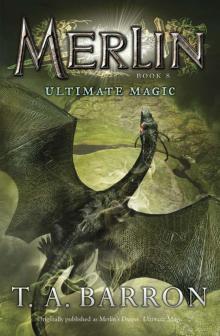 Ultimate Magic
Ultimate Magic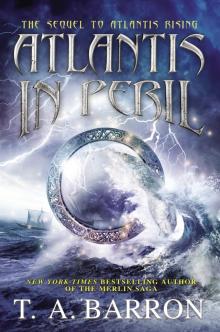 Atlantis in Peril
Atlantis in Peril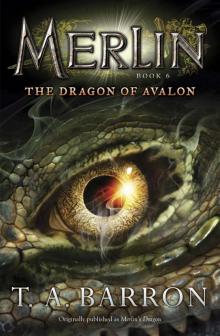 The Dragon of Avalon
The Dragon of Avalon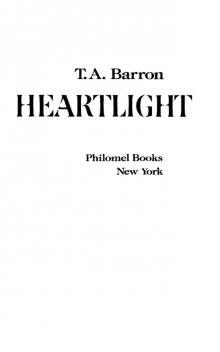 Heartlight
Heartlight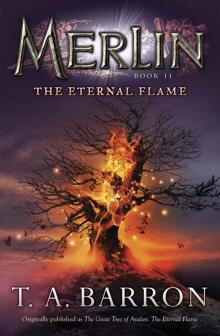 The Eternal Flame
The Eternal Flame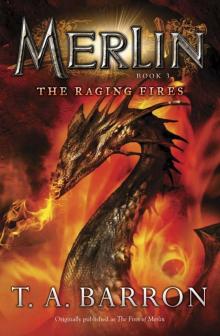 The Raging Fires
The Raging Fires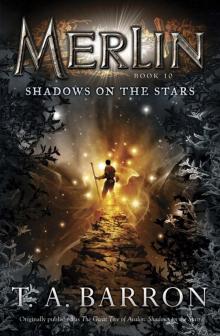 Shadows on the Stars
Shadows on the Stars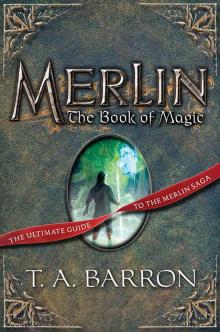 Merlin: The Book of Magic
Merlin: The Book of Magic The Lost Years
The Lost Years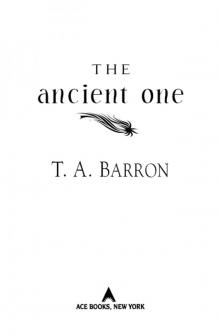 The Ancient One
The Ancient One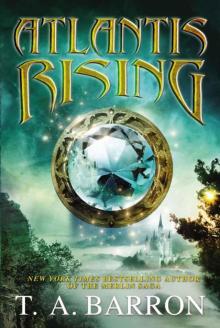 Atlantis Rising
Atlantis Rising